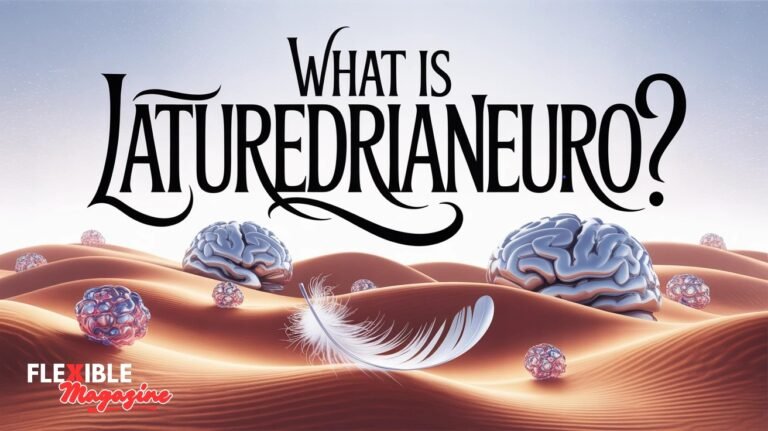The human brain is one of the most intricate and mysterious organs in the body. It governs everything we do — from simple movements to deep emotional responses. However, when something goes wrong within its complex network, it can lead to neurological disturbances, often referred to as How Are Laturedrianeuro Caused: Understanding the Complex Mechanisms Behind Neurological Disorders. Though the term “Laturedrianeuro” is not widely known, it represents a cluster of neurological dysfunctions resulting from genetic, environmental, metabolic, and lifestyle-related factors.
This comprehensive article explores in detail how Laturedrianeuro is caused, what biological mechanisms are involved, the different contributing factors, and how these conditions can be prevented or managed.
Understanding Laturedrianeuro
Before diving into the causes, it’s essential to understand what Laturedrianeuro actually represents. In the simplest terms, Laturedrianeuro refers to neurological disturbances that affect the brain, spinal cord, and peripheral nervous system. These disturbances can cause impairments in memory, coordination, thinking, movement, mood, or sensory perception.
Laturedrianeuro conditions can vary from mild cognitive changes to severe degenerative diseases such as Alzheimer’s, Parkinson’s, multiple sclerosis, or neuropathies. The onset and progression depend on multiple internal and external factors, which we’ll explore in detail below.
The Role of the Nervous System in Laturedrianeuro
The nervous system is divided into two main parts:
- Central Nervous System (CNS) – comprising the brain and spinal cord.
- Peripheral Nervous System (PNS) – consisting of all the nerves that branch out from the CNS to other parts of the body.
Any disruption in communication between these systems can lead to neurological dysfunction — or in this context, Laturedrianeuro. The brain relies on neurons (nerve cells) to transmit electrical and chemical signals. When neurons are damaged, misfiring, or dying, the system fails to function efficiently, resulting in cognitive or motor impairments.
How Are Laturedrianeuro Caused?
1. Genetic Factors
One of the primary How Are Laturedrianeuro Caused Behind Neurological Disorders lies within our DNA. Genetic mutations can predispose individuals to neurological disorders. These mutations may be inherited from parents or occur spontaneously due to cellular errors.
- Inherited Disorders: Conditions like Huntington’s disease, muscular dystrophy, and some forms of epilepsy are passed through generations via defective genes.
- De Novo Mutations: These are new mutations that occur in an individual for the first time and can alter the normal development of neurons.
2. Environmental Triggers
Exposure to toxic chemicals, radiation, or heavy metals can severely impact brain health. Substances such as lead, mercury, and pesticides are known neurotoxins that can alter nerve function, leading to neurological disorders.
- Air Pollution: Long-term exposure to polluted air increases the risk of neuroinflammation, which can accelerate cognitive decline.
- Industrial Chemicals: Workers exposed to solvents and industrial agents have higher risks of developing neurotoxic symptoms.
- Radiation Exposure: High doses of radiation can destroy healthy neural tissue, affecting memory, coordination, and learning abilities.
3. Traumatic Brain Injury (TBI)
Physical injury to the brain is another significant cause of Laturedrianeuro. A blow or jolt to the head can damage neural pathways, leading to memory loss, behavioral changes, or motor dysfunction.
- Concussions and Repeated Injuries: Common among athletes and military personnel, repeated head trauma can cause long-term degenerative conditions such as chronic traumatic encephalopathy (CTE).
- Penetrating Injuries: Gunshot wounds or severe accidents can lead to direct tissue damage and permanent neurological impairment.
In many cases, symptoms might not appear immediately but progress over time as brain cells continue to deteriorate.
4. Infections and Autoimmune Responses
Certain viral and bacterial infections can invade the nervous system, leading to inflammation or destruction of neurons. Examples include:
- Meningitis and Encephalitis: These infections cause inflammation of the brain and spinal cord membranes.
- HIV/AIDS: The virus can directly affect the brain, leading to cognitive and motor impairments.
- Autoimmune Disorders: In diseases like multiple sclerosis (MS), the immune system mistakenly attacks the protective myelin sheath around nerve fibers, disrupting electrical transmission.
When the immune system becomes overactive, it can cause chronic inflammation that gradually damages neural connections, leading to Laturedrianeuro symptoms.
5. Nutritional Deficiencies
Nutrients are the fuel for brain cells. A deficiency in essential vitamins and minerals can lead to impaired brain function.
- Vitamin B12 Deficiency: Essential for nerve cell maintenance; its lack can cause numbness, fatigue, and cognitive issues.
- Omega-3 Fatty Acids: Vital for neuron membrane health; insufficient intake can reduce brain plasticity.
- Iron and Zinc: Deficiency affects neurotransmitter production and cognitive performance.
Poor nutrition, especially over prolonged periods, can lead to irreversible neural damage and contribute to Laturedrianeuro-related dysfunctions.
6. Metabolic and Hormonal Imbalances
The brain is highly sensitive to changes in metabolism and hormone levels. Conditions such as diabetes, thyroid disorders, and adrenal dysfunction can contribute to neurological issues.
- Diabetes: Chronic high blood sugar damages blood vessels that supply oxygen to the brain, increasing the risk of neuropathy and dementia.
- Thyroid Disorders: Hypothyroidism can slow neural activity, while hyperthyroidism can overstimulate the brain, leading to anxiety and tremors.
- Adrenal Fatigue: Imbalanced cortisol levels can impair cognitive performance and memory.
These imbalances affect neurotransmitter regulation and neuronal communication, key factors in Laturedrianeuro development.
7. Aging and Degeneration
As we age, our brain naturally undergoes structural and chemical changes. Neurons lose their regenerative ability, and oxidative stress increases, leading to cell death.
- Protein Accumulation: Abnormal deposits of proteins like beta-amyloid and tau interfere with communication between neurons.
- Mitochondrial Dysfunction: Reduced energy production leads to slower brain activity and neuron fatigue.
- Decreased Neuroplasticity: The brain’s ability to form new connections weakens, affecting learning and memory.
These age-related factors play a crucial role in degenerative forms of Laturedrianeuro, such as Alzheimer’s or Parkinson’s disease.
8. Lifestyle Choices and Stress
Modern lifestyles often contribute to the rise of neurological issues. Chronic stress, lack of sleep, and poor habits can significantly affect brain health.
- Sleep Deprivation: Prevents the brain from clearing toxins accumulated during the day, impairing focus and memory.
- Chronic Stress: Overproduction of cortisol can damage the hippocampus, the brain region responsible for memory.
- Substance Abuse: Alcohol and drugs can alter brain chemistry and destroy nerve cells over time.
- Sedentary Lifestyle: Physical inactivity reduces oxygen flow to the brain, decreasing cognitive performance.
Adopting a balanced, active lifestyle can mitigate these risk factors and support long-term brain health.
Biological Mechanisms Behind Laturedrianeuro
At a cellular level, several processes contribute to the onset of Laturedrianeuro:
- Neuroinflammation: Chronic inflammation damages neurons and glial cells.
- Oxidative Stress: Excess free radicals destroy cell membranes and DNA.
- Excitotoxicity: Overstimulation of neurons by neurotransmitters like glutamate leads to cell death.
- Mitochondrial Dysfunction: Reduced energy supply weakens neuronal activity.
- Synaptic Failure: Disruption in communication between neurons results in cognitive decline.
These mechanisms often occur simultaneously, creating a complex interplay that accelerates neurological degeneration.
Prevention and Management of Laturedrianeuro
While some causes are unavoidable, many preventive measures can significantly reduce risk.
1. Nutrition and Diet
Consume foods rich in antioxidants, vitamins, and healthy fats. Include fruits, vegetables, nuts, whole grains, and omega-3 sources like fish or flaxseeds.
2. Regular Physical Exercise
Physical activity improves blood flow to the brain, enhances mood, and supports neuron growth.
3. Mental Stimulation
Engage in activities like reading, puzzles, and learning new skills to boost brain plasticity.
4. Adequate Sleep
Maintain 7–9 hours of quality sleep for optimal neural repair and toxin clearance.
5. Stress Management
Practice mindfulness, yoga, and deep breathing exercises to reduce cortisol levels.
6. Avoid Toxins and Drugs
Minimize exposure to harmful chemicals, and avoid substance abuse.
7. Routine Medical Checkups
Early diagnosis and treatment of underlying conditions like diabetes or thyroid disorders can prevent neurological complications.
Conclusion
How Are Laturedrianeuro Caused by a single factor but by a complex interaction of genetics, environment, lifestyle, and biological mechanisms. Understanding these causes allows us to take proactive steps toward prevention and management. By maintaining a healthy lifestyle, reducing exposure to toxins, and supporting mental well-being, we can significantly lower the risk of developing neurological issues and protect our brain’s health throughout life.
Frequently Asked Questions (FAQs)
1. Can Laturedrianeuro be cured completely?
Treatment depends on the underlying cause. While some forms are manageable, others are chronic and require ongoing care.
2. Is Laturedrianeuro hereditary?
Certain types are genetically inherited, but lifestyle and environmental factors also play a major role.
3. What are the early signs of Laturedrianeuro?
Symptoms may include memory loss, coordination problems, mood changes, and difficulty concentrating.
4. Can stress cause Laturedrianeuro?
Chronic stress can trigger biochemical changes that increase the risk of neurological disorders.
5. How can I reduce my risk of developing Laturedrianeuro?
Maintain a healthy diet, exercise regularly, manage stress, avoid toxins, and get adequate sleep.


